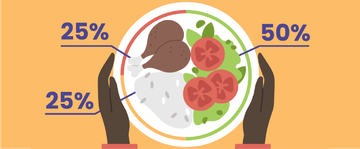How do you make healthy food choices?
Eating healthy is an important part of a healthy lifestyle. Here are some guidelines:
- Eat 3 meals a day, with healthy snacks.
- Increase fiber in the diet and decrease the use of salt.
- Drink water. Try to avoid drinks that are high in sugar. Fruit juice can have a lot of sugar, so choosing whole fruit is always a better choice.
- Eat fruit or vegetables for a snack.
- Eat more chicken and fish. Limit red meat intake and choose lean cuts when possible.
Meet MyPlate. MyPlate is a is a guideline from the U.S. Department of Agriculture to help you eat a healthy diet.

The MyPlate icon is divided into 5 food group categories, emphasizing the nutritional intake of the following on your plate:
- Grains - ¼ of your plate.
- Foods that are made from wheat, rice, oats, cornmeal, barley, or another cereal grain are grain products. Examples include whole wheat, brown rice, and oatmeal.
- Fruits and Vegetables - ½ of your plate.
- Vary your vegetables. Choose a variety of vegetables, including dark green, red, and orange vegetables, legumes (peas and beans), and starchy vegetables.
- Any fruit counts as part of the fruit group. Fruits may be fresh, canned, frozen, or dried, and may be whole, cut up, or pureed.
- Protein - ¼ of your plate.
- Go lean on protein. Choose low-fat or lean meats and poultry. Vary your protein routine — choose more fish, nuts, seeds, peas, and beans.
On the side of the plate
- Healthy plant oils – in moderation. Choose healthy vegetable oils like olive, soy, corn, sunflower, peanut. Others, such as animal fats, are solid and should be avoided.
- Drink water, coffee, or tea. Skip sugary drinks, and limit juice to a small glass per day.
- Milk products and many foods made from milk are considered part of this food group. Focus on fat-free or low-fat products, as well as those that are high in calcium. Limit milk and dairy products to one to two servings per day.
Average Rating: ☆ ☆ ☆ ☆ ☆ (1 reviews)


